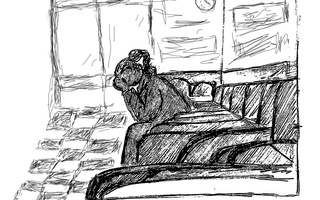Mark Vonnegut spoke yesterday at the Harvard Book Store about his experience overcoming mental illness, drawing from his experience as both a writer and a doctor.
Vonnegut, the son of Pulitzer Prize-winning author Kurt Vonnegut, sat for a book-signing for his most recent work, “Just Like Someone Without Mental Illness Only More So: A Memoir.”
He said the book continued the narration of his first memoir, “Eden Express: A Memoir of Insanity.” Completed nearly 40 years ago, that book recounts his diagnoses and recovery from schizophrenia during his years as a self-described hippy in the late 1960s.
“My first book wrapped up the complexity of mental illness in a neat little bow: guy is schizophrenic, guy recovers, guy gets married and lives happily ever after, but there’s more to the story than what I wrote,” Vonnegut said. “So, I wrote more.”
His new memoir chronicles his life following the mental breakdown depicted in “Eden Express.” The product of 40 years of writing, he said, Vonnegut’s new memoir recounts the return of “the voices,” a battle with alcoholism, and his experience as a pediatrician in Quincy, Mass., where he still runs his practice.
Vonnegut, who graduated from Harvard Medical School in 1979, spent the evening responding to Cambridge locals and Harvard affiliates alike with wit reminiscent of his late father’s lauded satires.
“Having a famous father is like having a leg up to nowhere,” Vonnegut said. Throughout the discussion he spoke about his father’s influence on his own appreciation for the arts.
“I learned the rhythms of how to write. I watched my father and saw that sitting in a chair and banging on your typewriter and crumpling and throwing away bits of paper were legitimate ways to spend your time,” said Vonnegut.
But the young Vonnegut, who said his father would have suffered post-traumatic stress disorder after his experiences in World War II without the influence of art, said that his family has a history of using writing as a therapeutic measure.
He emphasized the importance of using such therapeutic measures and treating people on an individual basis, determining what works best for each individual. “The medical model has morphed into ‘shut up and take your pills,’” Vonnegut said.
He criticized current medical practices that he said depend heavily on the diagnosis rather than a holistic approach to the individual’s wellbeing.
But he also recognized his anti-institutional views.
“I’m not even a little bit sorry that I was a hippy and tried to start a commune. The wisdom I gained was completely worthwhile.”
Read more in News
Gisela Striker’s Exit Casts Program In DoubtRecommended Articles
-
 On Loving Mailer—the Book and the Man
On Loving Mailer—the Book and the Man -
POSTCARD: Make Your Own Damn ParisA good traveler should make the effort to see a city as it is rather than as it once was, to forge his or her own impressions of a place instead of accepting at face value the recollections of a writer active long ago.
-
'Homeless to Harvard' Protagonist Releases MemoirThe real-life protagonist of “Homeless to Harvard" has released a memoir, which chronicles her assent from the streets of the Bronx to the sanctuary of Harvard Yard.
-
 Oates Mourns, Recounts Devastating 'Widow's Story'
Oates Mourns, Recounts Devastating 'Widow's Story' -
 God, Via Javerbaum, Visits the Coop
God, Via Javerbaum, Visits the Coop -
 10 Remarks by Salman Rushdie
10 Remarks by Salman Rushdie













